Worldlog Semana 37 – 2014
Son cinco para las doce o sea ha llegado un momento crítico si se trata de nuestros lugares de campo. Y esto lo hice saber también al Secretario de Estado de Agricultura en un debate la semana pasada sobre los mega establos. La política del Estado se encarga en que los Países Bajos se transformen en una gran área industrial con fábricas de animales. Entregue simbólicamente la primera piedra al Secretario del Estado con la pregunta que si podría entregarle esta piedra en el inicio de la construcción de un nuevo mega-establo. puesto. O sera esta piedra una ultima piedra?
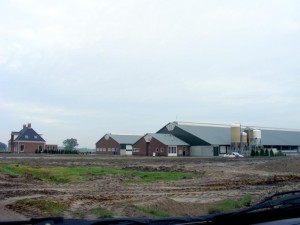
La entrada de un pueblo ya no será más un pasto lleno de vacas, sino un sitio lleno de fábricas de animales. Las pequeñas granjas familiares enfrentaran una competencia sin salida causada por las mega corporaciones. Ya desde ahora siete agricultores por día en los Países Bajos dejan de trabajar como tal y la tasa de vacantes de propiedades agrícolas en el año 2030 será más grande que las de las oficinas y tiendas… Esto tiene que parar!
Buenas noticias! Ante nuestra insistencia Holanda finalmente va a comprometerse con la detención de la horrenda masacre de delfines. El Ministro del Estado se comprometió a aprovechar la reunión anual de la Comisión Ballenera Internacional (CBI) para dar una mejor protección a los delfines. Hasta ahora las ballenas solo cayeron bajo el régimen de protección de la CBI, creando durante mucho tiempo una moratoria sobre la caza de ballenas. Holanda ahora abogará para proponer también una prohibición de la caza de delfines y pequeños cetáceos!
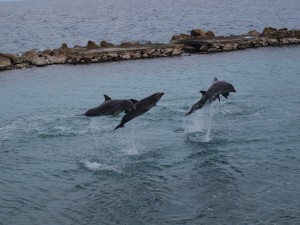
También nuestra representante en el Parlamento Europeo, Anja Hazekamp, hizo preguntas a la Comisión Europea, la que negocia en nombre de la EU con Japón sobre un tratado de libre comercio.
El sábado pasado tuvimos un día especial. Philip Wollen dio una conferencia en la Segunda Cámara para nuestros miembros. Un gran honor poder haberlo recibido. Wollen es el ex vicepresidente del CITIBANK. Después de salir de allí, se centró exclusivamente en la protección de los animales. Inició varios proyectos para ayudar a los animales en necesidad. El año pasado le entregamos por parte del Partido para los Animales un certificado por su gran obra a favor de los animales. A continuación se muestra un pequeño reportaje fotográfico:
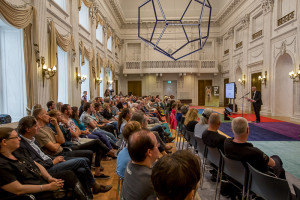
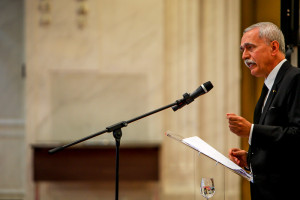
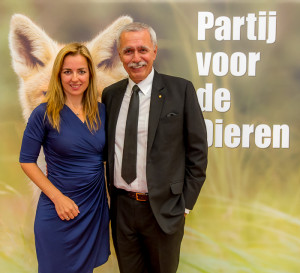
Vean aquí aquí como el aceite de palma destruye nuestra tierra: ‘Paradise for Palm Oil: The Greenwashing of Indonesian Deforestation’
La semana pasada fue martes sostenible. En la Segunda Cámara se presentaron muchas iniciativas para un mundo más duradero. Una de las iniciativas especiales viene de la Universidad Técnica de Delft. Con los estudiantes de tal universidad puedes transformar tu coche de gasolina en un coche eléctrico. Increíble!
En internet encontre un bonito cartoon sobre #greenwashing.
Time is running out for our countryside. And that is exactly what I told our State Secretary of Agriculture last week during a debate on mega stalls. The State Secretary’s policy is causing the Netherlands to turn into one big industrial area with animal factories. During the debate I symbolically gave the State Secretary a first brick and I asked her if it would be a first brick for the construction of a new mega stall, or if it could be a landmark?

Pigs flats and chicken towers are threatening to turn our green into grey. Because of bulk production, farming life has changed into a well oiled machine and trucks are driving from and to the farms with food, manure and cattle for slaughter. All this is made possible by the government’s intention to leave the decision on the construction of mega stalls up to the councils and provinces. In this way they are enabling local governments to routinely grant licences for mega stalls.
The border of a village will change from a field with cows to an area with animal factories. Small family farms will be driven out of business by mega farms. Seven farmers a day in the Netherlands already are giving up their work, and the vacancy of agricultural real estate will be higher in 2030 than that of offices and shops… This must stop!
Good news 🙂 Following our requests, the Netherlands is finally going to endeavour to end the horrific dolphin killings. The State Secretary promised to seize the annual meeting of the International Whaling Commission (IWC) to improve the protection of dolphins. Until now only whales have been subject to the IWC’s protection regime, as a result of which there has been a moratorium for whaling for years. The Netherlands is now going to plead for a ban on the hunting of dolphin and small whales.

Our member of the European Parliament, Anja Hazekamp, has also put written questions to the European Commission, which is negotiating on behalf of the EU with Japan on a free trade agreement.
Last Saturday was a special day for us. Philip Wollen gave a lecture in the Lower House for our members. It was a great honour to receive him. Philip Wollen is a former vice president of the Citibank. After he left there, he started to fully focus on the protection of animals. He initiated several projects to help animals in distress. Last year we granted him a Party for the Animals Award for all his fantastic work for animals. Below is a small photo report:
See here how palm oil is destroying our earth: ‘Paradise for Palm Oil: The Greenwashing of Indonesian Deforestation’
Last week it was sustainable Tuesday. Many initiatives were presented in the Lower House for a more sustainable world. One of the great initiatives came from the Technical University in Delft. You can have your petrol car “converted” into an electric one by students from the TU Delft 🙂 Brilliant!
I found a nice cartoon on internet on #greenwashing.
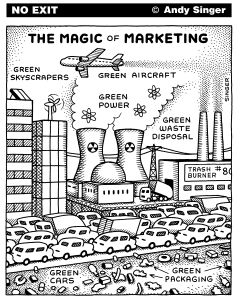 Until soon! Greetings, Marianne
Until soon! Greetings, Marianne